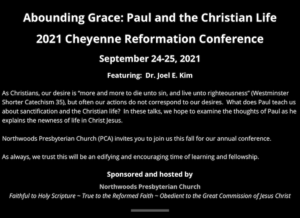In Luke 12:50, as part of a wide-ranging discourse with strong eschatological overtones, our Lord Jesus characterizes his coming death in a striking way. He said, “But I have a baptism with which to be baptized and how I constrained until it . . . Continue reading →
christian life
Is Persisting Sin Our Identity And May We Offer It To God?
A complex question came over the electronic transom this morning. It has at least two parts: (1) Is persistent sin (e.g., sexual sin or desire) our identity, who we are; (2) Does the Lord want us to offer this sin to him? . . . Continue reading →
Q&A: Are There Limits To Male Headship?
Recently I received an email at The Heidelblog from Katie with the following question: I’m getting a lot of stick from my guy friends. They say that I should always submit to their lead and that this is biblical. I tell them that . . . Continue reading →
Canons Of Dort (30): God’s Gracious Assurance Of Perseverance
The single most frequent way to corrupt the doctrine of perseverance has been to turn it into a covenant of works. This happens regularly outside the Reformed churches. E.g., the Romanists teach that, in baptism, sins are graciously washed away, initial justification . . . Continue reading →
The Late-Modern Oppression Olympics In Biblical Perspective
If you are, as I am, bewildered at the sight of biological males competing in female athletic events (e.g., track, wrestling, and weight lifting) or by the sight of wealthy, privileged Yale undergrads screaming at faculty members (for writing a memo asking for toleration for diversity in Halloween costumes), or by the prospect of a leading scholar and physician of gender dysphoria being banned from social media platforms for daring to suggest that minors should be required to wait until age 21 before undergoing permanent sex-reassignment surgery), or by rhetoric that implies that the social and economic conditions of ethnic minorities in the USA is virtually unchanged since the 1860s, there are two words that provide at least a partial explanation: subjectivism and oppression. Continue reading →
Does Romans 8:9–11 Require Believer’s Baptism?
A reader writes with a question about biblical interpretation and baptism: I was going through Colossians 2 when I read the footnote from the Reformation Study Bible… which sent me to page 41 for a more in-depth explanation. Infant baptism seems to make . . . Continue reading →
Romans Series: The Power of God For Salvation (27)
Romans is one of the greatest resources available to the Christian faith and life. Written in the mid-to late AD 50s to the congregation in Rome, Paul sent this pastoral letter to make clear the gospel, that salvation is from the Lord, . . . Continue reading →
Romans Series: The Power of God For Salvation (28)
Romans is one of the greatest resources available to the Christian faith and life. Written in the mid-to late AD 50s to the congregation in Rome, Paul sent this pastoral letter to make clear the gospel, that salvation is from the Lord, . . . Continue reading →
Some Practical Consequences Of Reformed Covenant Theology
It is exciting to discover what are sometimes called “the doctrines of grace,” i.e., the teaching that even though by nature we are dead in sins and trespasses, we came to faith because God loved us in Christ from all eternity and . . . Continue reading →
As It Was In The Days Of Noah (27): 2 Peter 1:3–11 (part 2)
3His divine power has granted to us all things that pertain to life and godliness, through the knowledge of him who called us to his own glory and excellence, 4by which he has granted to us his precious and very great promises, . . . Continue reading →
Office Hours: With Jon Payne On Discipleship And Revoice
Our Lord Jesus called the church to make disciples (Matt 28:18–20) and he even ordained means by which we might become disciples and grow in our discipleship. The Apostles followed this pattern (Acts 2:42; Rom 10:14). Nevertheless, when we think about discipleship . . . Continue reading →
Singing The Songs Of Zion In Babylon
Several weeks ago my pastor, Chris Gordon, reflected briefly in his morning sermon on Psalm 137. I have been meditating on it since. The theme of the believer’s exile in this world is frequently sounded in Scripture. Abraham was a pilgrim, who . . . Continue reading →
With The Laymen’s Lounge Podcast: What Are Proper Expectations For the Christian Life?
Jason Estopinal is the host of the podcast and he writes: “It’s been said that for fish that living under water, with all they’ve ever known is underwater living, and all the other fish around them also only know underwater living—that these . . . Continue reading →
Living Through A Time Of Great Loss
Americans born after World War II, for most of that time, have experienced prosperity and medical progress hitherto unknown in human history. We have been led to expect that, given enough resources, medical science can conquer virtually anything. In an undated story . . . Continue reading →
A Beginner’s Guide To Addressing Spiritual Abuse In The Church
Recently I had an interesting exchange on social media regarding the extent of spiritual abuse by leaders in confessional Presbyterian and Reformed Churches. The charge is that spiritual abuse is a widespread problem in the confessional Presbyterian and Reformed world. I am . . . Continue reading →
Do Not Insist on Your Own Way
Recently, I have been reading Carl Trueman’s excellent newest book, The Rise and Triumph of the Modern Self (Crossway, 2020), and listening to Christianity Today’s fascinating podcast about Mark Driscoll’s ministry, The Rise and Fall of Mars Hill. One thing that stood out to me, which I think captures an ongoing pastoral issue throughout the church, is the predominance of preferences. Continue reading →
Asking For A Friend: How To Love A Jerk
Who Says That Calvin Was Not Practical?
…But how do we do that with someone we might think to be unworthy of our love and good deeds? How do you love a jerk? You might say take a look in the mirror. Humbly realizing that we’re all unworthy jerks . . . Continue reading →
September 24–25, 2021: Joel Kim On “Abounding Grace—Paul And The Christian Life” (Cheyenne, WY)
Our annual conferences exist to advance and celebrate the truths of the Protestant Reformation, present the greatness of the gospel of Jesus Christ and encourage a reawakening to the holiness of God. Annually, the conference seeks to draw world class scholars who can lead listeners to a fuller understanding of the truths and riches of Holy Scripture. The conference will challenge you to think more Biblically as you live your life before the face of God. Continue reading →
All Over-Realized Eschatologies Are Attempts To Change The Rules Of The Game
Some years ago, while explaining Heidelberg Catechism 114, on the moral law, I wrote, “Paul was not a Gnostic, a Valentinian, an Anabaptist, a Familist, nor an Antinomian. Continue reading
Believer, You Are A Romans 7:25 Christian
Against The Presumption Of Perfectionism
Thanks be to God through Jesus Christ our Lord. Therefore, consequently, on the one hand, I myself serve the law of God with my mind but, on the other, with the flesh I serve the law of sin.”—The Christian Testimony of the Apostle Paul. Continue reading →















